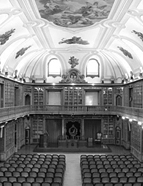

The hard-core members of this commission established by the ACL were João Pedro Ribeiro, Joaquim José Ferreira Gordo and Friar Joaquim de Santo Agostinho. An indispensable condition for the accomplishment of this task was in-depth knowledge of diplomatics and palaeography and, therefore, several authors such as Friar Joaquim Forjaz, Friar Joaquim de Santa Clara, Friar Joaquim de Santa Rosa de Viterbo, José Anastácio de Figueiredo and José Veríssimo Álvares da Silva collaborated in the undertaking.
These ACL members reported on the information they themselves had collected in letters to Correia da Serra, between 1788 and 1794 (published by António Baião, A Infância da Academia[The Academy's Infancy], 1934). In their correspondence, they describe the vicissitudes associated with the demanding work of collecting sources, the difficulties and costs involved in hiring amanuenses and copyists to help prepare indexes and transcribe documents. João Pedro Ribeiro travelled around the North and Centre of the country. In his correspondence with Correia da Serra, where he confesses " I am having fun here going around these registry offices" (Baião, op. cit., p.1), he mentions visits to monasteries and town halls in Minho (Ponte de Lima, Viana, Caminha, Valença), Vila Real, Coimbra, Lamego, Guimarães, Braga, Porto and Aveiro. He certifies the diversity of the inventoried and registered documentation, stating, in relation to Porto, that "all the registry offices in Lisbon together do not measure up to one in this province" (ibid, p. 6), and invariably complains about the poor conditions of their conservation. Since any attempt to publish selected or partial manuscripts that might be considered more relevant was either unjustified or totally impractical, João Pedro Ribeiro suggested to Correia da Serra that a detailed "Chronological Index" should be prepared by the academics conducting the survey to later be continued by the city councils of the kingdom, which would be responsible for preserving the information and documentation in their archives (ibid, pp. 8-9). In order to carry out the ACL's mission, João Pedro Ribeiro was released from his teaching duties at the University of Coimbra, which caused him some concern, as this would render him unable to fully exercise his duties and damage his career and academic power (ibid, pp. 34-35). However, despite these inconveniences, the ACL mission with which he was entrusted was of key importance to the subsequent creation of the chair of Diplomatics at the University of Coimbra and to enhancing his prestige and authority in the field of national history and the techniques inherent to the occupation of historian.
